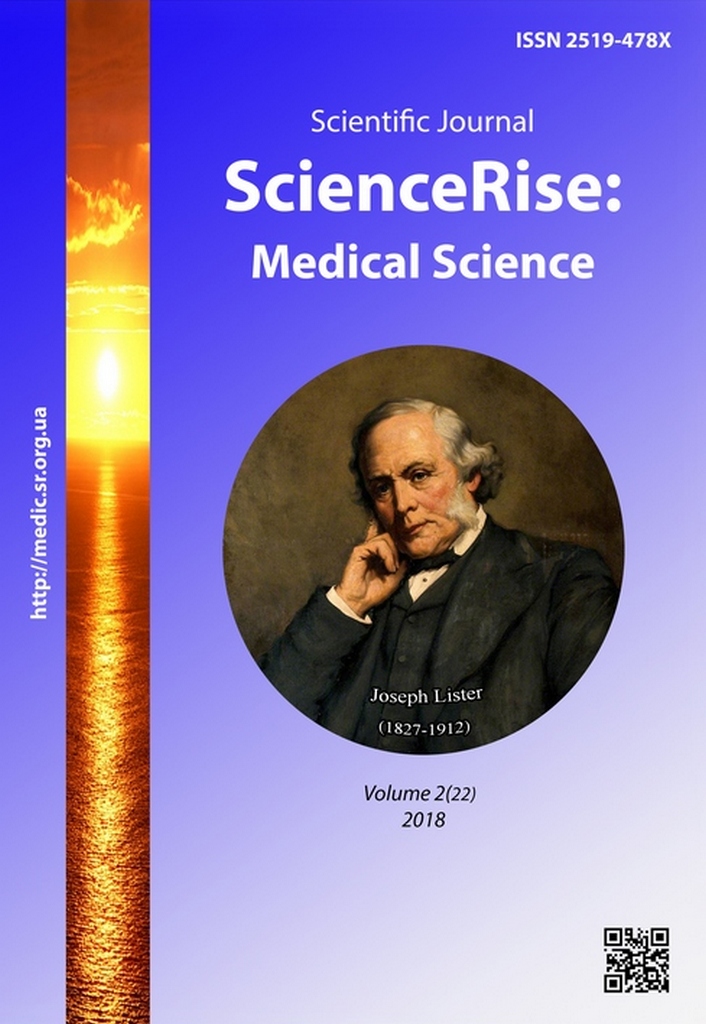Medical and psychological support of medical students in the case of maladaptive reactions and states
DOI:
https://doi.org/10.15587/2519-4798.2018.124867Keywords:
medical students, adaptation disorders, medical and psychological support, psycho education, psychotherapy, psychoprophylaxisAbstract
Aim of the research - to develop a system of medical and psychological support of medical students in case of occurrence of their maladaptive reactions and states.
Object and methods. A total clinical-anamnestic, clinical-psychopathological and psychodiagnostic examination of 412 students of the Kharkiv National Medical University at the age of 17-22 years old (average age of 18.0±2.0 years) was carried out for solving the stated task, observing the principles of bioethics and deontology. 52.2% of students (215 people) composed the group I of surveyed students - residents of eastern Ukraine; 21.1% (87 students) - the group II - residents of Luhansk and Donetsk regions, who entered the study at the KhNMU before the ATO; 26.7% (110 people) were the group III - seized immigrants.
Methods of research: clinical-anamnestic, psychodiagnostic, statistical.
Results. As the results of the study showed, 73.0% of the I examined group of the students, 63.6% of the II students and 7.8% of the III group did not show signs of maladaptation, in some cases they presented only a few complaints, mainly on the general feeling of intense learning .
In 27.0% of the examined students of group І, 36.4% - ІІ and 92.2 - ІІІ groups, the mental state could be classified within the clinically designed states of psychological maladaptation, manifestations of which were emotional disorders: decreased mood, the appearance of related thoughts about their low significance, the inability to cope with the training load.
The system of medical and psychological support of medical students was developed, which consisted of three consecutive stages: diagnostic psychotherapeutic intervention and psychoprophylaxis.
The stage of psychotherapeutic intervention was aimed at correction of emotional state, relevance reduction of psycho-traumatic situations, normalization of mood background, restoration of psychosocial activity and mental efficiency, increase of stress resistance, formation of productive coping strategies, assimilation of adaptive forms of behavior and motivation for their realization.
Conclusions. In the system of psychotherapeutic correction of the disorder of adaptation to medical students it is expedient to use complex of rational psychotherapy, autogenous training, cognitive-behavioral therapy of Beck, art therapy and psycho-educational trainings.
The system of psychoprophylaxis for the development of maladaptation states should include measures of the primary (development and implementation of the program of medical and psychological support, assessment of personality characteristics of students and prediction of their behavioral reactions, reducing the level of emotional tension); secondary (early diagnosis of maladaptive reactions and conditions, timely and adequate correction) and tertiary (prophylaxis of relapse of maladaptive states, control of the risk group for the development of adaptation disorders) of psychoprophylaxis.
References
- Yur'eva, L. N. (2017). Krizisy professional'noy deyatel'nosti vracha i puti ih preodoleniya. Zdorovia Ukrainy, 2 (41), 23–24.
- Aimedov, K. V., Strelbytska, S. M. (2014). Profesiyna mobilnist maibutnikh fakhivtsiv u protsesi navchannia u VNZ: kompetentnisnyi pidkhid. Naukovi pratsi. Seriya: Pedahohika, 251 (239), 49–52.
- Chaban, O. S., Khaustova, O. O., Trachuk, L. Ye. (2016). Shliakhy pidvyshchennia efektyvnosti navchannia studentiv za spetsialnistiu «Medychna psykholohiya». Medychna psykholohiya, 1, 3–8.
- Slobodianiuk, D. P. (2015). Zahalni polozhennia psykhokorektsiyi ta psykhoprofilaktyky sotsialnoi dezadaptatsiyi u molodi. Mizhnarodnyi psykhiatrychnyi, psykhoterapevtychnyi ta psykhoanalitychnyi zhurnal, 8 (3 (29)), 79–85.
- Malakhov, P. S., Asieieva, Yu. O., Kharitonova, A. S. (2016). Problemnist adaptatsii studentiv-medykiv. Medychna psykholohiya, 2, 3–5.
- Pshuk, N. H., Slobodianiuk, D. P. (2015). Rol psykhosotsialnykh chynnykiv v genezi sotsialnoi dezadaptatsiyi u studentskoi molodi. Ukrainskyi visnyk psykhonevrolohiyi, 23 (2 (83)), 86–91.
- Yurieva, L. M. (2017). Obrazovatel'nye programmy profilaktiki sindroma vygoraniya u specialistov, rabotayushchih v sfere ohrany psihicheskogo zdorov'ya. Ukrainskyi visnyk psykhonevrolohiyi, 25 (4 (93)), 11–14.
- Kozhina, G. M., Markova, M. V., Grinevich, E. G., Zelens'ka, K. O. (2011). K probleme adaptacionnogo sindroma studentov mladshih kursov VUZov III-IV urovney akkreditacii. Arkhiv psykhitriyi, 17 (4 (67)), 32–35.
- Kiosieva, O. V. (2016). Psihopatologicheskaya harakteristika emocional'noy sfery u studentov mladshih kursov. Ukrainskyi visnyk psykhonevrolohiyi, 24 (1 (86)), 60–63.
- Kovalenko, M. V. (2014). Strukturnyi analiz perfektsionizmu u studentiv vyshchykh navchalnykh medychnykh zakladiv. Ukrainskyi visnyk psykhonevrolohiyi, 22 (3 (80)), 65–68.
- Lobunets, H. Yu. (2012). Problema rozladiv psykhichnoi sfery studentiv, yaki maiut invalidnist. Medychna psykholohiya, 4, 48–50.
Downloads
Published
How to Cite
Issue
Section
License
Copyright (c) 2018 Maksim Khaustov

This work is licensed under a Creative Commons Attribution 4.0 International License.
Our journal abides by the Creative Commons CC BY copyright rights and permissions for open access journals.
Authors, who are published in this journal, agree to the following conditions:
1. The authors reserve the right to authorship of the work and pass the first publication right of this work to the journal under the terms of a Creative Commons CC BY, which allows others to freely distribute the published research with the obligatory reference to the authors of the original work and the first publication of the work in this journal.
2. The authors have the right to conclude separate supplement agreements that relate to non-exclusive work distribution in the form in which it has been published by the journal (for example, to upload the work to the online storage of the journal or publish it as part of a monograph), provided that the reference to the first publication of the work in this journal is included.









